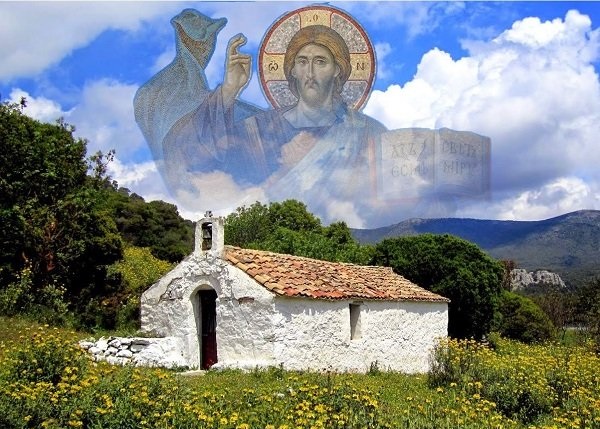‘This same Jesus, who has been taken from you into heaven, will come back in the same way that you have seen him go into heaven’
29 May 2020‘This same Jesus, who has been taken from you into heaven, will come back in the same way you have seen him go into heaven’ (Acts 1, 9-11).
With the handing-back of the great feast, yesterday saw the completion of forty days after Easter, and today our Holy Church celebrates the joyous event of Our Lord Jesus Christ’s glorious Ascension into heaven. In other words, we celebrate His return to the right hand of our God and Father. Therefore today is one of the twelve feasts of the Lord.
It was for the good of the disciples that the Lord ascended, because otherwise the Spirit would not have descended upon them, since He is the Spirit of the Word and dwells in Him.
The feast of the Ascension is therefore a precursor of the great feast of Pentecost, as we hear in the hymns at Vespers: ‘The Lord has ascended into heaven in order to send down the Comforter to the world’.

After His radiant Resurrection from the dead, Our Lord didn’t immediately abandon the world, but, for forty days, continued to appear to His disciples, according to the book of the Acts of the Apostles: ‘After his suffering, he presented himself to them and gave many convincing proofs that he was alive. He appeared to them over a period of forty days and spoke about the kingdom of God’ (Acts 1. 3). According to Saint Luke, Christ’s post-Resurrection appearances to them were of great significance. The formerly doubtful and fearful disciples had to experience the event of the Resurrection of their Teacher and to cast off every trace of hesitation and disbelief towards Him.
Again according to Saint Luke, on the fortieth day: ‘When he had led them out to the vicinity of Bethany, he lifted up his hands and blessed them. While he was blessing them, he left them and was taken up into heaven. Then they worshiped him and returned to Jerusalem with great joy. And they stayed continually at the temple, praising God’ (Luke 24, 50-53).
In today’s Gospel for the feast, Christ asked for and ate ‘a piece of cooked* fish and a honeycomb’ (Luke 24, 42). Why is this detail mentioned? According to Church tradition this is of great allegorical significance. As regards the fish, we know that, although it lives in the briny waters of the sea, its body isn’t salty, but sweet. In a similar manner, Christ lived in the briny waters of sin in this world, but ‘he committed no transgression, nor was there any guile in his mouth’ (Is. 53, 9). Equally, Christ remained more silent than a fish when he suffered His saving Passion and was subjected to those unheard of torments and unmentionable profanities.
Concerning the honey and wax in the honeycomb, we know that the honey is sweet and the wax is illuminating, so they are thought of as symbols of the spiritual delight and enlightenment given to the faithful by Christ after His Resurrection.
The Ascension of Our Lord undoubtedly represents the culmination of His presence on earth and His redemptive task. He ‘ascended in glory’ to confirm His divine capacity to His disciples. Today, we celebrate the crowning of His work of redemption and the triumphant culmination of what He achieved for us. As the kontakio for the feast says: Christ our God, upon fulfilling Your dispensation for our sake, You ascended in Glory, uniting the earthly with the heavenly, not departing but remaining unseparated, and You cried out to those who love You, ‘I am with you and no one is against you’.
Today’s feast represents the great celebration of the opening of heaven to us, heaven as our new and eternal home, heaven as our true homeland. It’s our own ascent into heaven, given that Christ was taken up not as God but as God and human. Saint John Chrysostom says that ‘He ascended also in our nature’. The Lord’s Ascension manifests not only His divinity but also the highest honor towards us as people. Jesus ascends, but, at the same time, so do those who are in Him. Moreover, Christ’s Ascension reminds us that the glorious return of Our Savior to the throne of the Godhead also brings with it infinite redemptive gifts for the whole of the universe, for the whole of creation.
Christ said: ‘Behold I am with you on all days, until the completion of the age’ (Matth. 28, 20), and all the joy of the Christian faith lies in the recognition of His presence. As He promised: ‘Where two or three are gathered in my name, I am there in the midst of them’ (Matth. 18, 20). Let us keep our hearts and our selves pure, so that we may be aware of the presence of Christ n our life. Let us keep ourselves estranged from the passions and our weaknesses which war against us and hinder our union with Jesus.
* ὀπτός = ‘roasted, broiled, baked or burnt’






